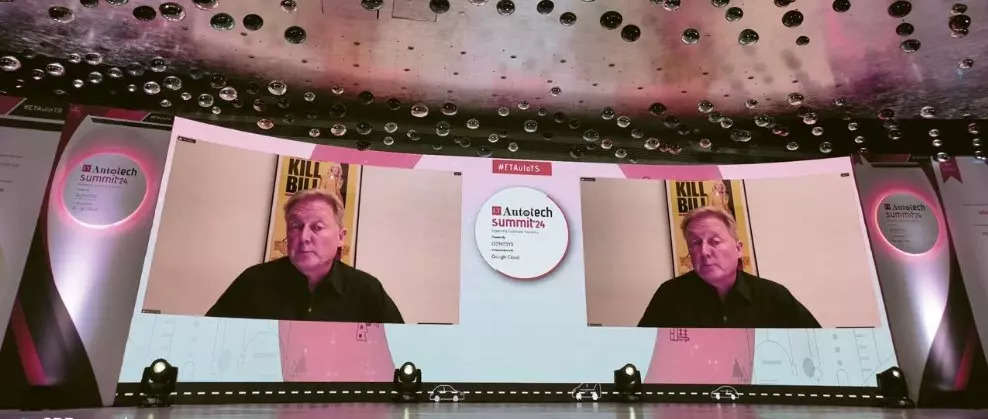
New Delhi: Although the global electric vehicle (EV) sales growth has been slowing lately, Henrik Fisker, Founder & CEO, Fisker Inc believes the future of EVs is “very bright” and we are on the verge of “seeing some of the most exciting cars ever created”.
“There is a lot of negative sentiment around EVs right now, but I believe we are going to get to a sustainable future with a majority of vehicles being EVs. It is easy to criticize, and it is hard to create. My motto is never give up,” Fisker said, at the 5th edition of the 2-day ETAutoTech Summit in Bengaluru.
He admitted that while the auto industry might be the hardest to succeed, the nascent EV industry is even more difficult. But he is personally “excited about doing great work in this industry and bringing new innovative EVs to the world”. The charging infrastructure is in the early stages of becoming as reliable as gas fueling systems. Other challenges on the manufacturing front, development cost, government policies also exist.
The CEO of the California-headquartered EV company expects that by 2030, 50% of new car sales will be electric in most parts of the world, especially in the US, Europe and China. In the times to come, connectivity, design, innovative features, and branding will play a differentiating role in the development of new vehicles.
Giving an example of US-based Tesla, he noted that when a company takes the first mover advantage and establishes a sizable lead in this industry, “it can be very difficult for competitors to catch up”.
According to the auto designer turned CEO, EV startups have the same advantage as they are starting with a clean sheet of paper, and do not have to worry about legacy technology.
Founded in 2016, Fisker Inc delivered its first vehicle, the Ocean electric SUV last year. The EV maker was once seen as a rival to Tesla and others. However, it filed for bankruptcy protection last month. With doubts spiraling around the EV startup’s future, the CEO seemed quite confident of the rise of the industry.
Chinese Dominance
Fisker suggests that China’s EV revolution will resemble how Japanese automakers set up in the 1970s. Eventually, they will start manufacturing in North America.
“Even with high tariffs, Chinese EVs will come to the US and establish themselves just like Honda and Toyota did a decade ago. Joint ventures and local production will enable Chinese EV makers to achieve scale and capture the market share.” However, they need to get the branding and design “up to the level that is competitive”.
In 2023, over 8 million electric cars were sold in China. According to market research firm TrendForce’s recent report from February this year, Chinese manufacturers hold three of the top five spots for global market share – with BYD at 17%, GAC Aion at 5.2% and SAIC-GM-Wuling at 4.9%.
With confidence in the future of Chinese OEMs in the EV market, Fisker believes that the automakers in the West and Japan could fall far behind leaving the vital market share vulnerable and creating a dire scenario for the future of their businesses.
“Currently, they are reluctant to confront the situation head on because their internal combustion engine (ICE) business continues to represent the bulk of their revenues and profits. In fact, they need to sustain the ICE business for longer than they might otherwise want to, in order to fund the transition to the EV world that I predict is coming. China has also shown that building a market on ICEs does not mean that an effective pivot to EVs is not possible.”
Talking about the EV switch in the European markets, Fisker stated that it has largely been driven by the dieselgate and government subsidies.
India Growth Story
Fisker believes there is a tremendous opportunity for automakers and startups worldwide, more so in the rapidly growing markets such as India. He is certain that in many ways “India is where China was a decade ago”.
According to the ‘India Electric Vehicle Report 2023′ by Bain and Company in collaboration with Blume Ventures, the domestic EV market is at an inflection point and is poised for significant growth, with the potential to achieve over 405 penetration by 2030 against 5% currently.
The growth is expected to be driven by strong adoption (over 45%) in both two and three-wheeler categories while four-wheelers’ (cars) penetration is projected to grow to over 20%, the report said.
Fisker is of the view that with fast adoption of two and three-wheeler EVs in India, vendors will gain expertise, electrical grid and suppliers will have time to prepare and people will get used to plugging in. This will all make it easier for the Indian market to move towards EVs.
However, he stressed on the need to ramp up the charging infrastructure and critically focus on domestic battery manufacturing to get greater control of the EV market size.
India has a great benefit to take on the learnings from other countries and their experiences with EVs, Fisker added.
Designing sports electric cars
Henrik Fisker, the renowned car designer, has had a hand in successfully designing luxury cars, for the likes of BMW and Aston Martin. He feels that EVs are fast and fun, presenting new opportunities for design. “They do not have to make room for old ICE components that take up space.” However, as fantastic as they are, EVs can not bring the same sensory experience to driving in sports cars that traditional gas powered high performance models do.
In the future when we go fully-electric, sports cars will actually be the most difficult problem for the industry to solve. These vehicles are all about stimulating your senses, but with an EV you do not have that same sense of control, he said.
Talking about the possibility, he added that while there are high performance all-electric sports cars that are already being assembled in the market, some companies might want to continue with petrol-powered vehicles in low volumes.
“As we continue to develop EVs in the coming decade, we may figure out the interest of the auto industry to explore how we retain the sense of human and machine engagement for sports cars lovers.”
















